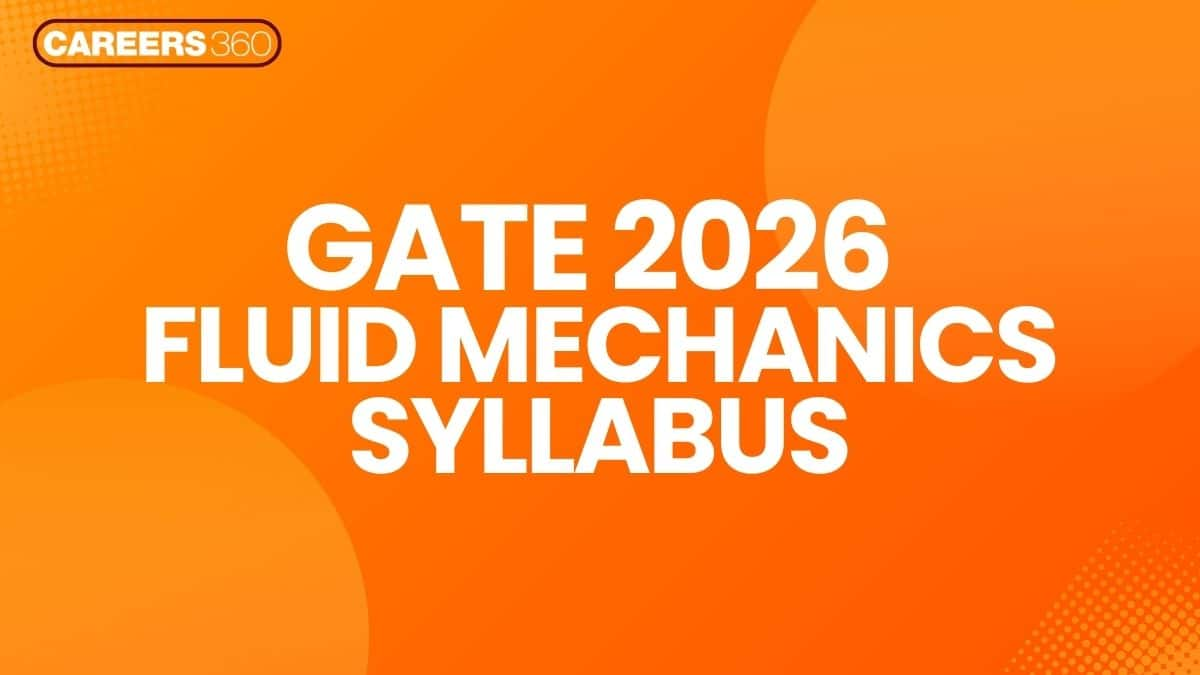UPES M.Tech Admissions 2026
Last Date to Apply: 25th Feb | Ranked #45 Among Universities in India by NIRF | 1950+ Students Placed 91% Placement, 800+ Recruiters
GATE 2026 Fluid Mechanics Syllabus - IIT Guwahati has uploaded the GATE 2026 syllabus for Fluid Mechanics on the official website, gate2026.iitg.ac.in. Aspirants must cover all the topics mentioned in the syllabus to ensure high scores. The GATE fluid mechanics paper is an optional subject in the engineering sciences exam. Along with the syllabus, candidates must also be aware of the GATE 2026 Engineering Sciences exam pattern, as fluid mechanics is included under XE. The GATE 2026 exam will be conducted on February 7, 2026. Candidates can check the detailed topic-wise GATE fluid mechanics syllabus 2026 on this page.
The details mention on the GATE 2026 response sheet are:

The fluid mechanics syllabus for GATE 2026 comprises nine chapters. The authority will prepare the GATE question paper as per the GATE fluid mechanics syllabus 2026. Along with the syllabus, candidates must check the GATE exam pattern to understand the format of the exam. Candidates are advised to practice the GATE mock tests after completing the GATE 2026 fluid mechanics syllabus.
GATE Fluid Mechanics syllabus 2026
IIT Guwahati has released the GATE fluid mechanics syllabus online. The GATE 2026 fluid mechanics syllabus includes topics such as flow and fluid properties, differential analysis, internal flows, external flows and more. The GATE engineering mathematics section has a weightage of 15 marks.
Chapters | Topics |
|---|---|
Flow and Fluid Properties | Fluid Properties: Density, viscosity, surface tension, relationship between stress and strain-rate for Newtonian fluids. Classification of Flows: Viscous versus inviscid flows, incompressible versus compressible flows, internal versus external flows, steady versus unsteady flows, laminar versus turbulent flows, 1-D, 2-D and 3-D flows, Newtonian versus non-Newtonian fluid flow. Hydrostatics: Buoyancy, manometry, forces on submerged bodies and its stability. |
Kinematics of Fluid Motion | Eulerian and Lagrangian descriptions of fluid motion. Concept of local, convective and material derivatives. Streamline, streakline, pathline and timeline. |
Integral Analysis for a Control Volume | Reynolds Transport Theorem (RTT) for conservation of mass, linear and angular momentum. |
Differential Analysis | Differential equations of mass and momentum for incompressible flows. Inviscid flows - Euler equations and viscous flows - Navier-Stokes equations. Concept of fluid rotation, vorticity, stream function and circulation. Exact solutions of Navier-Stokes equations for Couette flow and Poiseuille flow, thin film flow |
Dimensional Analysis | Concept of geometric, kinematic and dynamic similarity. Buckingham Pi theorem and its applications. Non-dimensional parameters and their physical significance - Reynolds number, Froude number and Mach number. |
Internal Flows | Fully developed pipe flow. Empirical relations for laminar and turbulent flows: friction factor, Darcy-Weisbach relation and Moody’s chart. Major and minor losses. |
Bernoulli’s Equation and its Applications, Potential Flows | Bernoulli’s Equation: Assumptions and applications. Flow measurements - Venturi meter, Pitot-static tube and orifice meter. Elementary Potential Flows: Velocity potential function. Uniform flow, source, sink and vortex, and their superposition for flow past simple geometries. |
External Flows | Prandtl Boundary Layer Equations: Concept and assumptions. Boundary Layer Characteristics: Boundary layer thickness, displacement thickness and momentum thickness. Qualitative idea of boundary layer separation, streamlined and bluff bodies, and drag and lift forces. |
Candidates appearing for the GATE fluid mechanics (XE-B) paper can check the GATE paper pattern for fluid mechanics below. Using the exam pattern, candidates can find key details such as the marking scheme, duration, types of questions and more.
Particulars | Details |
|---|---|
Examination Mode | Computer Based Test (Online) |
Duration | 3 Hours |
Section |
|
Type of Questions |
|
Total Marks | 100 Marks |
Marking Scheme |
|
GATE Negative Marking |
|
Frequently Asked Questions (FAQs)
Yes, the GATE fluid mechanics 2026 syllabus has been released online.
On Question asked by student community
Hello,
The link to the question paper is attached here. You can also find the answer key that will help you analyse your in-depth performance. Careers360 provides students with preparation tips that will help them utilise their time effectively in preparartion.
https://engineering.careers360.com/articles/gate-metallurgical-question-papers
Thank you
Hello,
Yes, you can get admission in M.Tech CSE without GATE .
Through university entrance exams
Many universities conduct their own M.Tech entrance exams. You have to qualify the test and sometimes attend an interview.
Through JET for M.Tech
JET (JAIN Entrance Test) is conducted by Jain University.
It is
Hii
No you cannot get admission to IIT for M Tech if your B Tech is not completed at the time of admission, even if you clear the GATE cutoff but Yes, you can appear for GATE 2028 in your 3rd year of B Tech even if your degree is
Hello,
The link to the question paper is attached here. You can access the question papers along with the answer key on the careers360 website. Careers360 also provides students with preparation tips that will help them in preparing and the mock test and analyse their in-depth performance.
https://engineering.careers360.com/articles/last-15-years-gate-papers-solutions
Thank you.
Hello,
Here is a link for the sample papers for GATE Exam with DA subjects. Tap on the link given below to open it:
Thankyou.
Among top 100 Universities Globally in the Times Higher Education (THE) Interdisciplinary Science Rankings 2026
NAAC A+ Accredited | Among top 2% Universities Globally (QS World University Rankings 2026)
Last Date to Apply: 25th Feb | Ranked #45 Among Universities in India by NIRF | 1950+ Students Placed 91% Placement, 800+ Recruiters
1st in NPTEL program of 6 IITs | Highest CTC 72 LPA | Scholarships to meritorious students
Asia’s only university to be awarded the highest accreditation by WASC, USA and by the Quality Assurance Agency for Higher Education (QAA), UK
Online PG programs from Symbiosis Centre for Distance Learning